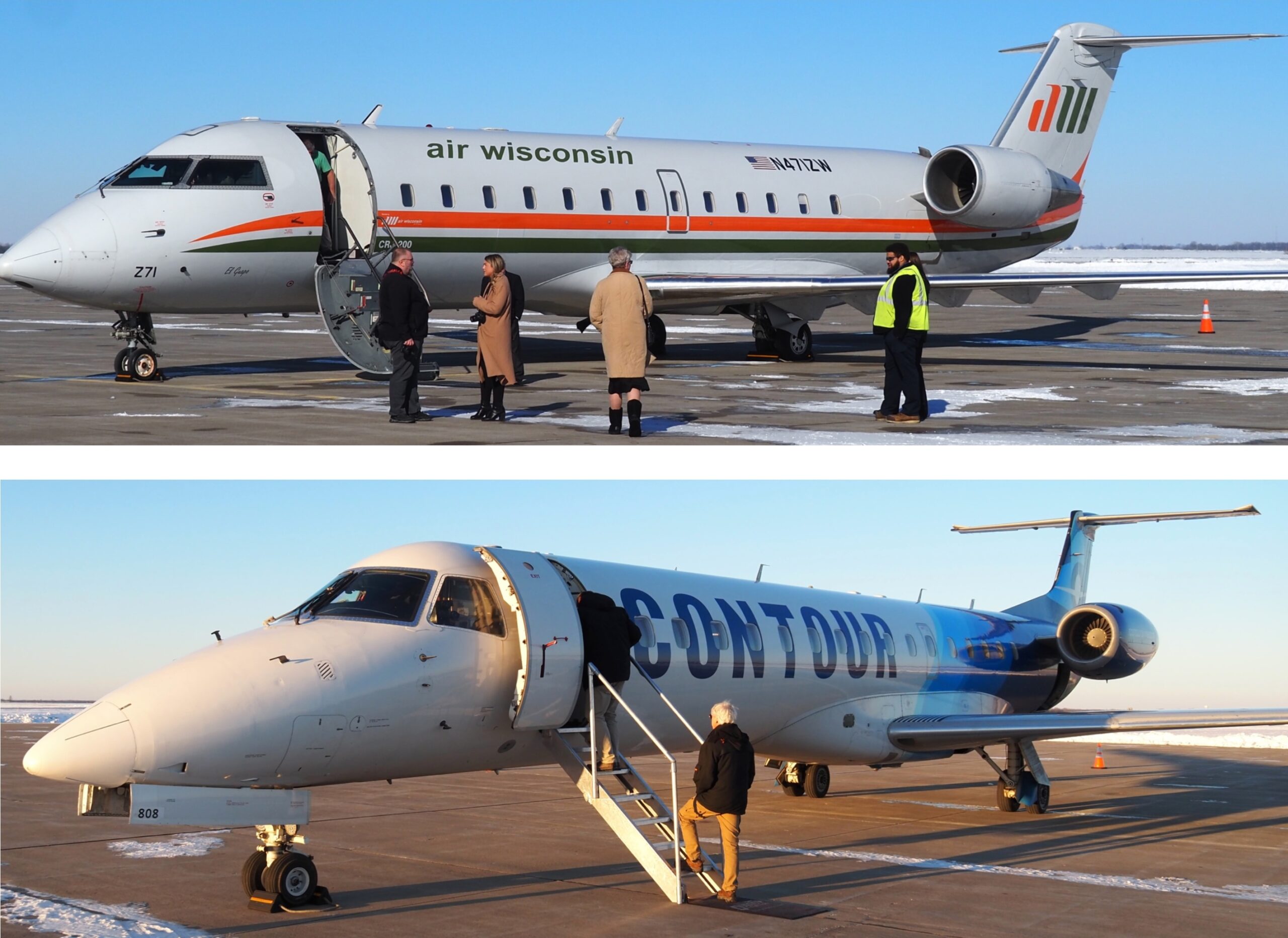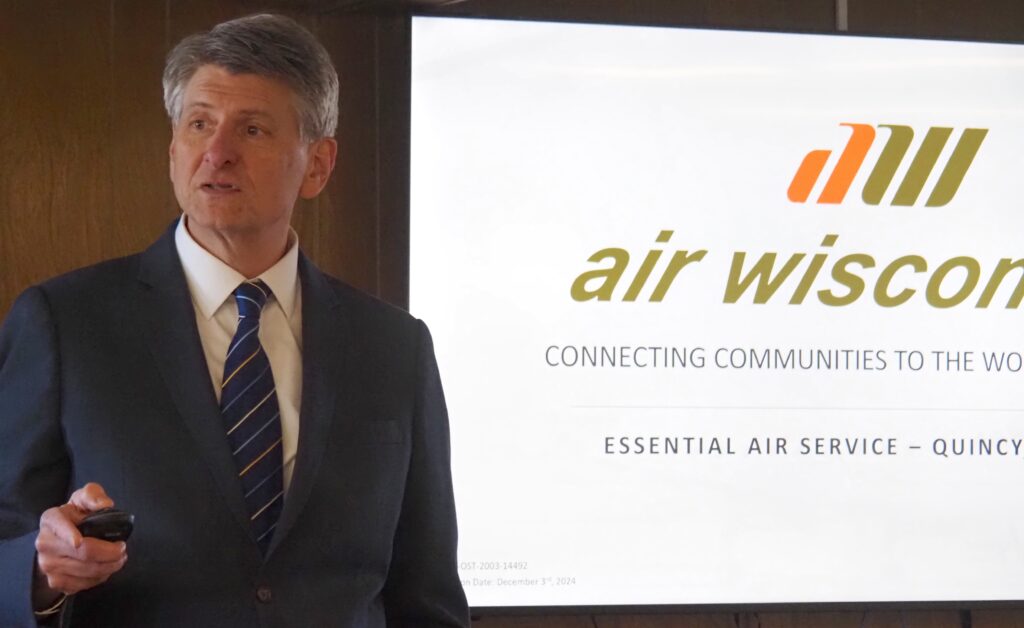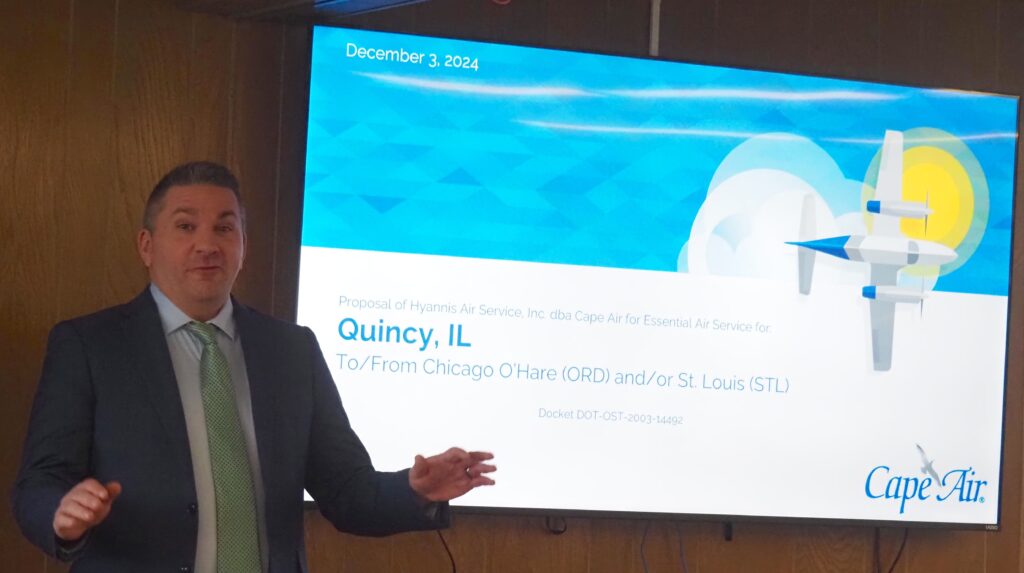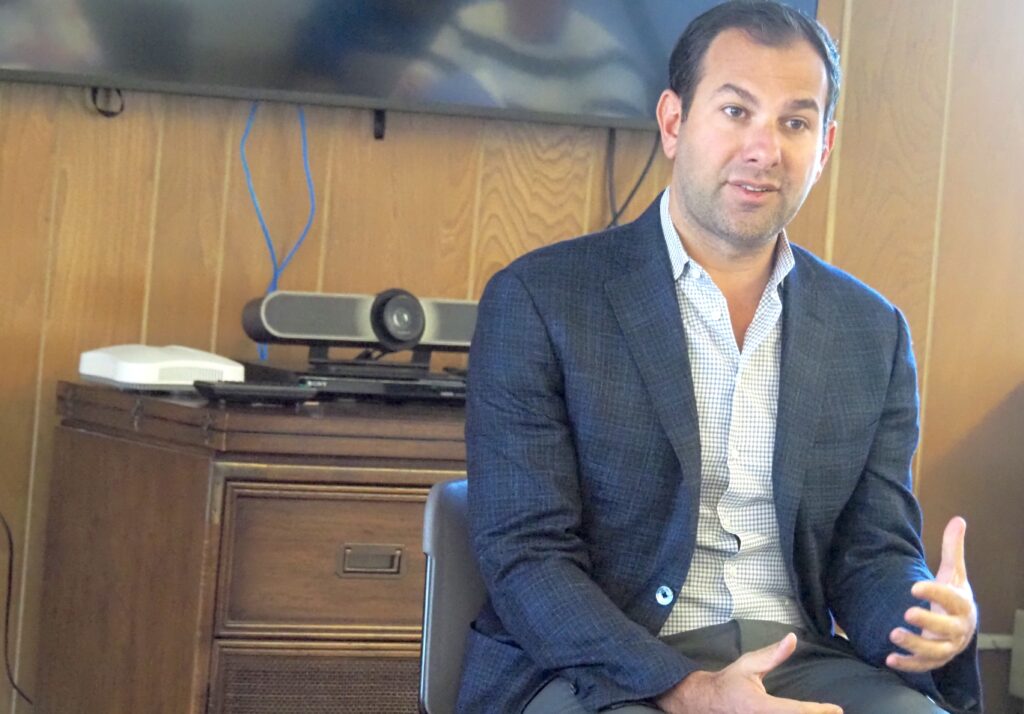Three airlines make pitches to become EAS provider as Quincy tries to get enplanements back over 10,000

QUINCY — Members of the City of Quincy’s Aeronautics Committee noted during its Wednesday afternoon meeting that the upcoming decision to select the next essential air service (EAS) provider for Quincy Regional Airport is critical.
The airline must help Quincy’s enplanement count climb above 10,000 so the airport can qualify for $1 million in federal funding. The last year Quincy reached that level was 2019, and airport director Bill Lantz said the airport received federal funding in 2020, 2021 and 2022 because of COVID waivers.
“10,000 is a really serious number,” he said.
Quincy hasn’t even hit half of that number in the past two years, with 4,710 enplanements in 2023 and 4,480 in 2024. Committee members expressed concern that if similar numbers continue, Quincy may no longer be eligible for federal funding, possibly forcing the airport to close.
Quincy Mayor Mike Troup expressed concerns with the U.S. Department of Transportation in June about “significant issues” regarding passenger safety and canceled flights with Southern Airways Express, which is in the second year of a four-year EAS contract in Quincy.
The Department of Transportation agreed and gave air carriers a Nov. 14 deadline to submit proposals to replace Southern, which is scheduled to make 18 round trips per week to Chicago O’Hare International Airport and 18 round trips per week to St. Louis-Lambert International Airport, using Cessna 208 aircraft capable of carrying eight or nine passengers.
Air Wisconsin, Cape Air and Contour made presentations Wednesday to a subcommittee created by Troup that eventually will make a recommendation to the Quincy City Council before the end of this month.
Three other airlines — Boutique Air, Southern Airways Express and SkyWest — filed proposals last month with the U.S. Department of Transportation to provide essential air service. However, they were not selected to make presentations to the subcommittee.
Below is a review of each presentation on Wednesday.

Air Wisconsin
- Offering 12 weekly Quincy to Chicago round trips or one daily Quincy to Chicago round trip and five Quincy to St. Louis round trips; proposing a two-year contract.
- Will use 50-seat Bombardier CRJ200 jets.
- Proposed subsidies for 12 Quincy to Chicago flights — $6,893,108 in year 1 and $7,375,625 in year 2. Projected enplanements — 21,814. Fare — $75.
- Proposed subsidies for Quincy to Chicago and Quincy to St. Louis flights — $6,776,532 in year 1 and $7,250,889 in year 2. Projected enplanements — 18,720. Fare — $60.
- Codeshare partnership with American Airlines.
- Touting 99.9 percent controllable completion rate last year (only flights not completed for mechanical or pilot issues count against the rate) and 98.4 percent completion rate of all flights (including flights canceled for weather issues).
Robert Binns, president and CEO of Air Wisconsin, told the subcommittee that it operates as a Part 121 carrier, which has more requirements for its pilots — more training and experience required and a minimum of two pilots (a captain and a first officer) on each flight — along with more stringent safety requirements.
Binns also said a growing revenue stream for the airline is providing charter flights for colleges and universities to NCAA competitions. He said the airline owns 63 jets.
“We own all of our aircraft. We own all of our engines. We own all of our parts,” he said. “We are the only airline of scale in the United States that doesn’t have any debt. We own all of our assets outright, and so that gives us not only financial stability but operational flexibility as well.”
Quincy would have to come up with extra money to have Quincy Fire Department personnel available for all flights if Air Wisconsin is selected as the EAS carrier.
“We understand that’s an added expense to the community, but respectfully, we think it’s an investment worth making,” Binns said. “Not only are you bringing the highest level of aviation safety to your community, but you give a sense of confidence in your community of both the airport and the airline that’s serving the airport, which we think drives traffic dispatchers.”
Binns said passengers who fly out of Quincy to the 350 destinations American Airlines offers will get a single booking and an American Airlines flight number for their entire journey.
“In an interline (agreement), two airlines agree to work together to transfer people, passengers and bags, but what they do is price independent tickets,” he said. “If you’re connecting to Chicago on American and something goes wrong, there’s one number to call. With an interline, something goes wrong and you often have to call both airlines.”
Binns suggested to the subcommittee that choosing 12 flights to Chicago allows for more flexibility to Quincy passengers than choosing flights to Chicago and flights to St. Louis.
“We let you decide that,” he said. “You know your community best. You know what the community wants.”
Air Wisconsin, which also made a presentation Wednesday in Burlington, Iowa, is trying to acquire its first EAS contract.
“We see an opportunity for an airline our size, an airline with the equipment and an airline with the resources,” Binns said. “We have an airline with the maintenance capability, an airline that owns all of its parts, and we think we can operate reliably. It’s not just Quincy. (There are) a lot of EAS markets where there isn’t reliable operation. A lot of communities have seen the loss of traffic. We think we can come in and boost the traffic numbers at these airports. We think it’s a good fit for our company.”

Cape Air
- Offering 36 weekly Quincy to St. Louis round trips or 21 weekly Quincy to Chicago round trips and 18 weekly Quincy to St. Louis round trips; proposing two-year and four-year contracts.
- Will use 9-passenger P2012 Tecnam Traveller twin-engine planes.
- Proposed subsidies for 36 flights to St. Louis — $3,983,915 in year 1 to $4,203,030 in year 2 for two-year contract; $3,934,116 in year 1 to $4,619,602 in year 4 for four-year contract. Projected enplanements — 14,516. Fare — $75.
- Proposed subsidies for 21 flights to Chicago and 18 to St. Louis — $8,617,302 in year 1 to $9,091,254 in year 2 for two-year contract; $8,509,586 in year 1 to $9,992,308 in year 4 for four-year contract. Projected enplanements — 14,719. Fare — $90.
- Interline partnerships with United, Delta, American, Hawaiian, JetBlue, Alaska, Qatar and Condor.
- Touted 99.3 percent controlled completion rate in 2024. Airline officials did not have figures for completion rates of flights that may have been affected by weather.
Aaron Blinka, vice president of Cape Air, said the airline would not offer codeshare partnerships on the flights to St. Louis or Chicago. He said Cape Air has interline agreements with more than 80 percent of the flights going in and out of Chicago.
“From a customer perspective, there is not a great deal of difference from codeshare (and interline),” he said. “You can still do a one-stop shop, seamless ticketing and a seamless itinerary with us in any of these areas. In addition, we participate in several of the major airlines’ rewards or prerequisite programs.”
Cape Air doesn’t currently operate in Chicago or St. Louis, but Blinka was confident it would.
“We have previously, and we had a larger Midwest operation,” he said. “That’s another piece of this puzzle. These are communities and cities and airports that we’ve operated in before. We have the experience. We have the rapport and relationship with these airports to be able to initiate our service quickly and certainly know how to operate in both these airports.”
Cape Air was awarded a four-year, $10.8 million contract in September 2021 to be the EAS provider for Quincy. However, the airline announced in May 2022 that a pilot shortage was forcing them to submit a 90-day notice to end EAS service.
Blinka admitted Cape Air, if awarded the EAS contract again, would have to rebuild the community’s trust.
“The last time around, we fired ourselves because we knew we weren’t doing right by the community,” he told the subcommittee. “We knew that we couldn’t continue on the path that we were on and successfully operate and execute. We’re not going to sit there and continue to struggle. We recognized that we couldn’t have a successful operation. We know now that we can. Pilot staffing is no longer an issue.”
Blinka’s presentation focused on frequency of flights. He said the Tecnam Travellers would likely be capped at seven passengers for flights during the winter months.
“When you have high frequency, you give the local traveler numerous options to be able to make it home or to their business destination the same day, and there’s less waiting time in Chicago or St Louis to make your flight,” he said. “That customer is more likely to fly in the future because of that experience.”
Manistee County (Mich.) Blacker Airport transitioned its air service carrier from Cape Air to Contour in October.

Contour Airlines
- Offering 12 weekly Quincy to Chicago flights or seven weekly Quincy to Chicago flights and five weekly Quincy to Nashville flights; proposed four-year contract.
- Will use 30-seat ERJ-135/145 jets produced by Brazilian aerospace company Embraer.
- Proposed subsidy in year 1 — $6,491,881.50. Projected enplanements — 20,952. Fare — $60 (with occasional $39 supersaver offers).
- Interline partnerships with American, United and Alaska.
- Recorded 83.9 percent on-time performance (ranked third in the country) with a 96 percent completion factor in 2023; reporting increases in enplanements at Kirksville, Mo., (119%), Marion, Ill. (140%) and Owensboro, Ky. (204%).
CEO Matt Chaifetz told the subcommittee about the airport in Macon, Ga., which had gone for a couple of years without essential air service. Prior carriers had attracted about 2,000 to 3,000 passengers, offering service to Atlanta — about 90 miles away.
“We acquired a couple of regional jets to start the route, and we grew Macon from about 3,000 total passengers a year to almost 30,000 passengers,” Chaifetz said. “Macon has not asked for an RFP (request for proposal) since 2017. They have chosen to stay with Contour because they’re that happy with the service.”
He said he has not seen a market that didn’t enjoy an increase in enplanements by going from eight-passenger planes to jets.
“Every market that we’ve taken over, whether it be from Cape Air or Boutique or Southern … we’ve doubled passenger counts,” Chaifetz said.
He read part of an email from the airport director in Manistee County that said, “I’m still waiting for final December numbers, but given the preliminary information I have, it looks like Contour beat Cape Air’s best December by about 75 percent and likely achieved an all-time best December for enplanements.”
“We’ve been there for three months,” Chaifetz said. “There are likely a lot of people who have been alienated from the service that Southern has provided here, who have written off flying out of Quincy. The best way to get them to come back is to make it a no-brainer for them by offering a different product to say, ‘Hey, we know what happened last time. This is something completely different.’”
He noted that Contour recently offered $12 flights in December out of Fort Leonard Wood, Mo., to help that airport reach 10,000 enplanements.
“I think our track record of rehabilitating cities that have been decimated by poor service speaks for itself,” Chaifetz said. “We have more experience doing that than anyone else.”
Chaifetz then told the subcommittee that Air Wisconsin was “effectively just terminated” by American Airlines in December, negotiating an early termination to the agreement.
“Outside of charter (flights) and EAS flying that they don’t currently have, there is no business that’s not publicly disclosed,” he said. “(Air Wisconsin has) already gone through two out of the three largest carriers (United and Air Wisconsin parted ways in 2022), and Delta no longer operates any 50-seat aircraft. There’s nobody left to go to, which is why they’re putting in EAS bids. In my opinion, two EAS contracts are not going to save the company.”
He called Air Wisconsin a “fine company” but said it has “failed to adapt to the changing industry around them.”
Chaifetz said all Contour flights will have two pilots.
“If you’re flying with one, somebody died,” he said.
Chaifetz said he believes a Quincy-to-St. Louis flight “makes no sense,” admitted it would be an unpopular opinion.
“St. Louis is a market that people should be driving to,” he said. “It is hard to let go of something. Listen, there are, no doubt, a lot of ties between Quincy and St Louis. But that doesn’t mean that it is the right route to be operating, particularly when the largest carrier in St. Louis is Southwest, which doesn’t connect with any other partner airlines.”
Chaifetz also suggested alternate EAS service for Quincy instead of traditional EAS service. He explained that traditional EAS is a contract between the Department of Transportation and the airline director, while the Department of Transportation reimburses the community in an alternate EAS contract. The community enters into a contract directly with the airline, so the airline is accountable to the community.
“One of the benefits of that is that you can put in certain clauses,” he said. “Certain communities have been hurt by the carrier before us. (Airport officials have) said, ‘It’s great that you say you’re going to be so reliable, but how can we be assured?’ My response was,
‘Put it in the contract. Hold us to a performance standard. We don’t meet our performance standards, get rid of us.”
Miss Clipping Out Stories to Save for Later?
Click the Purchase Story button below to order a print of this story. We will print it for you on matte photo paper to keep forever.

